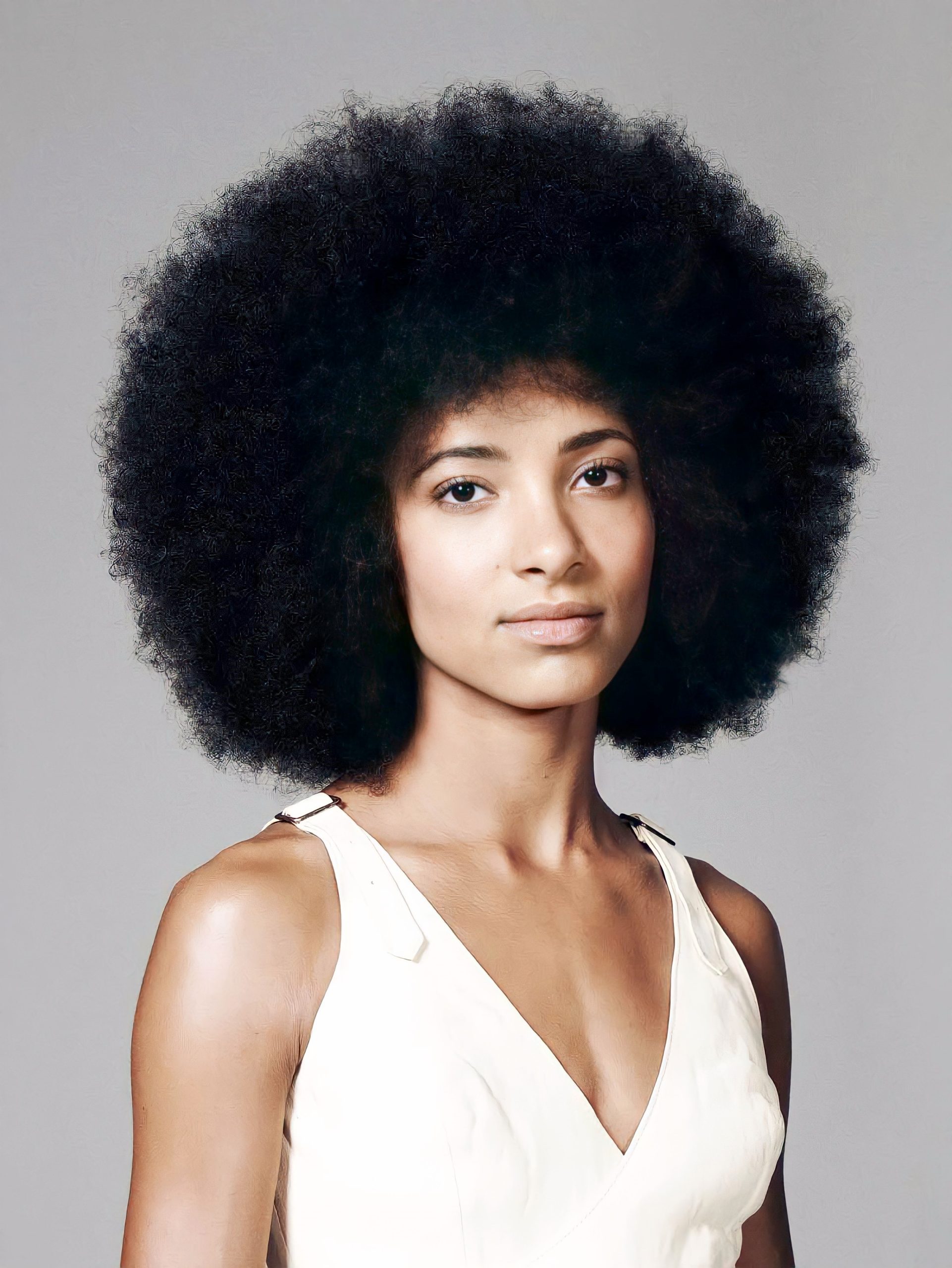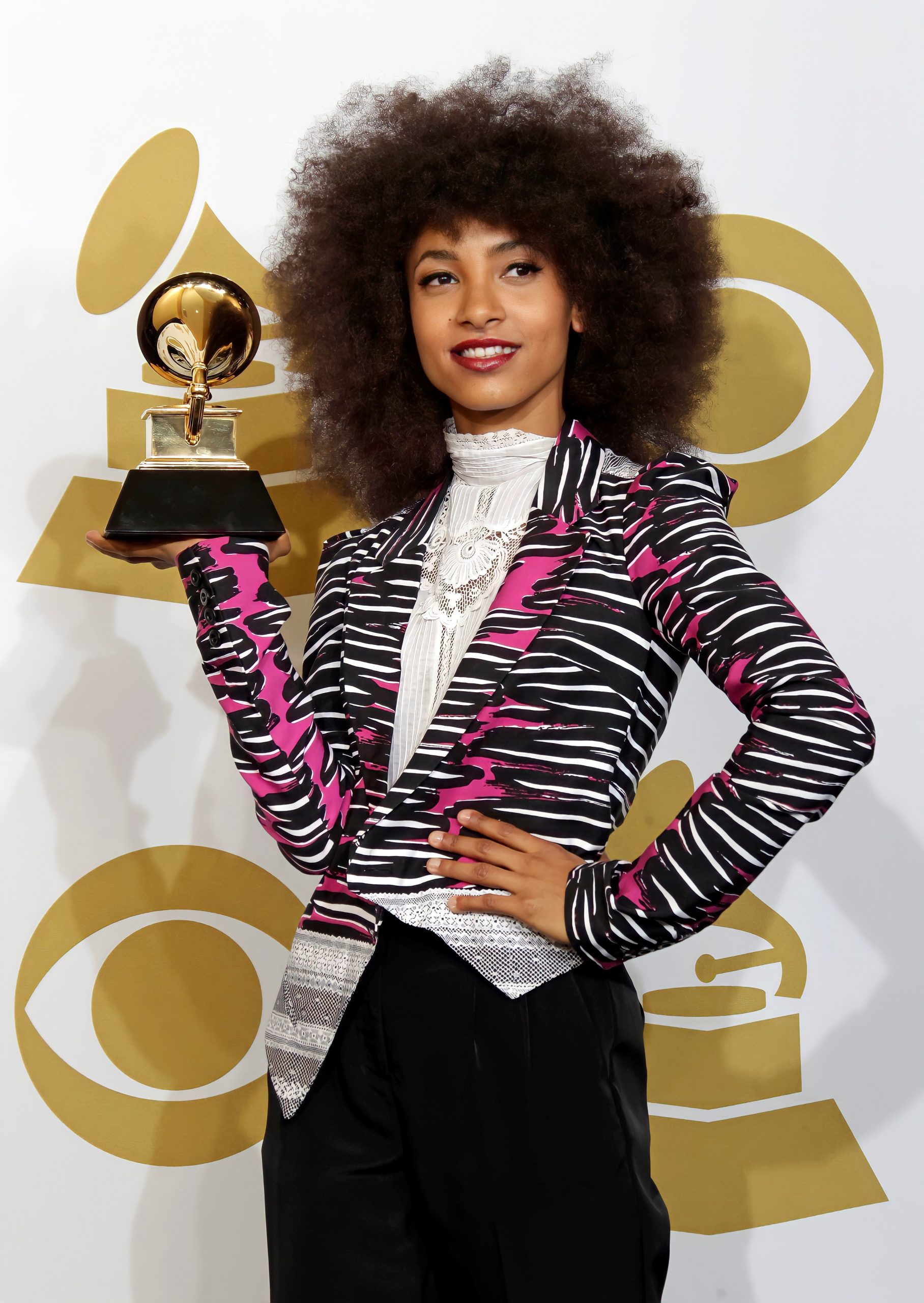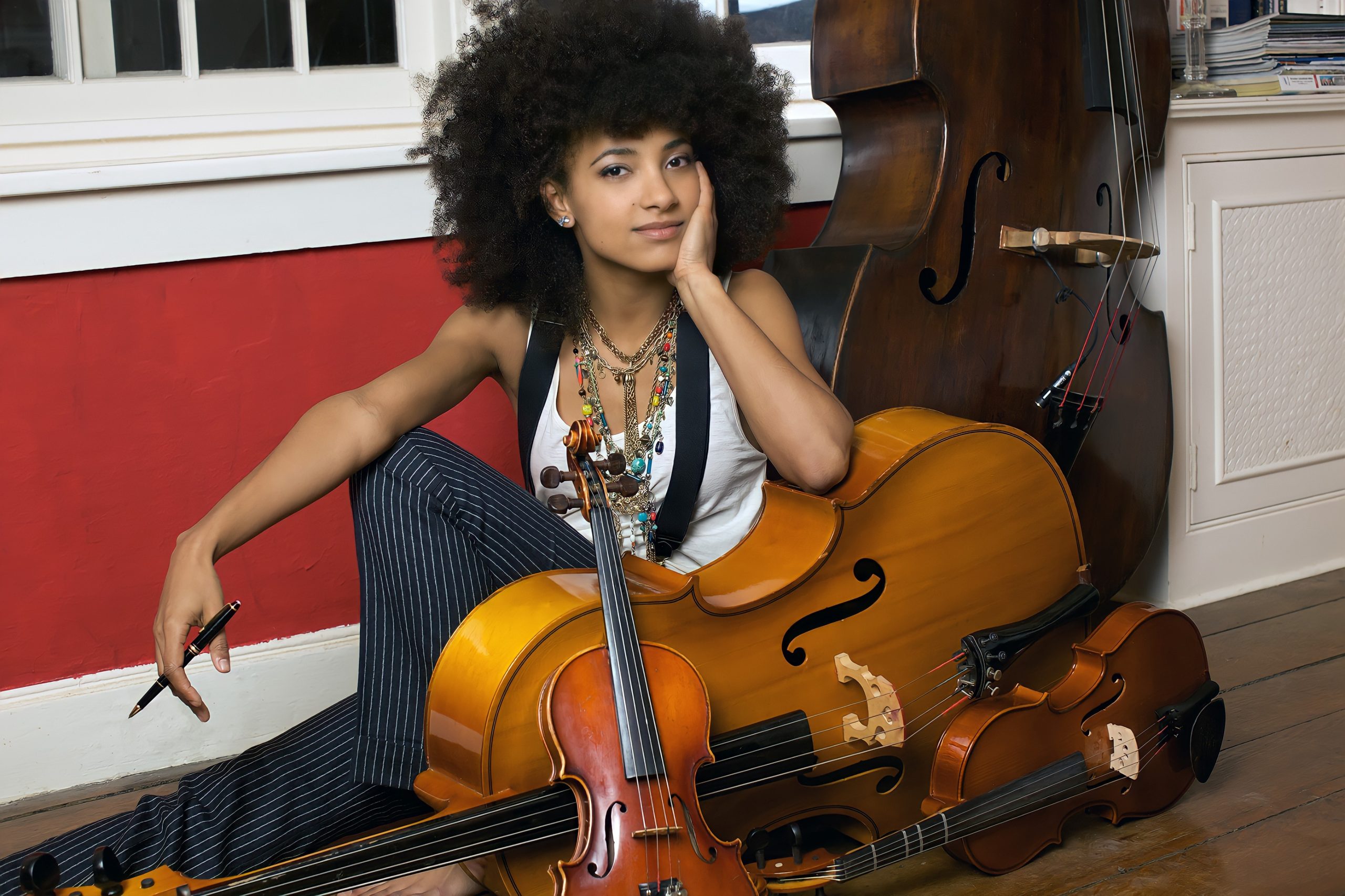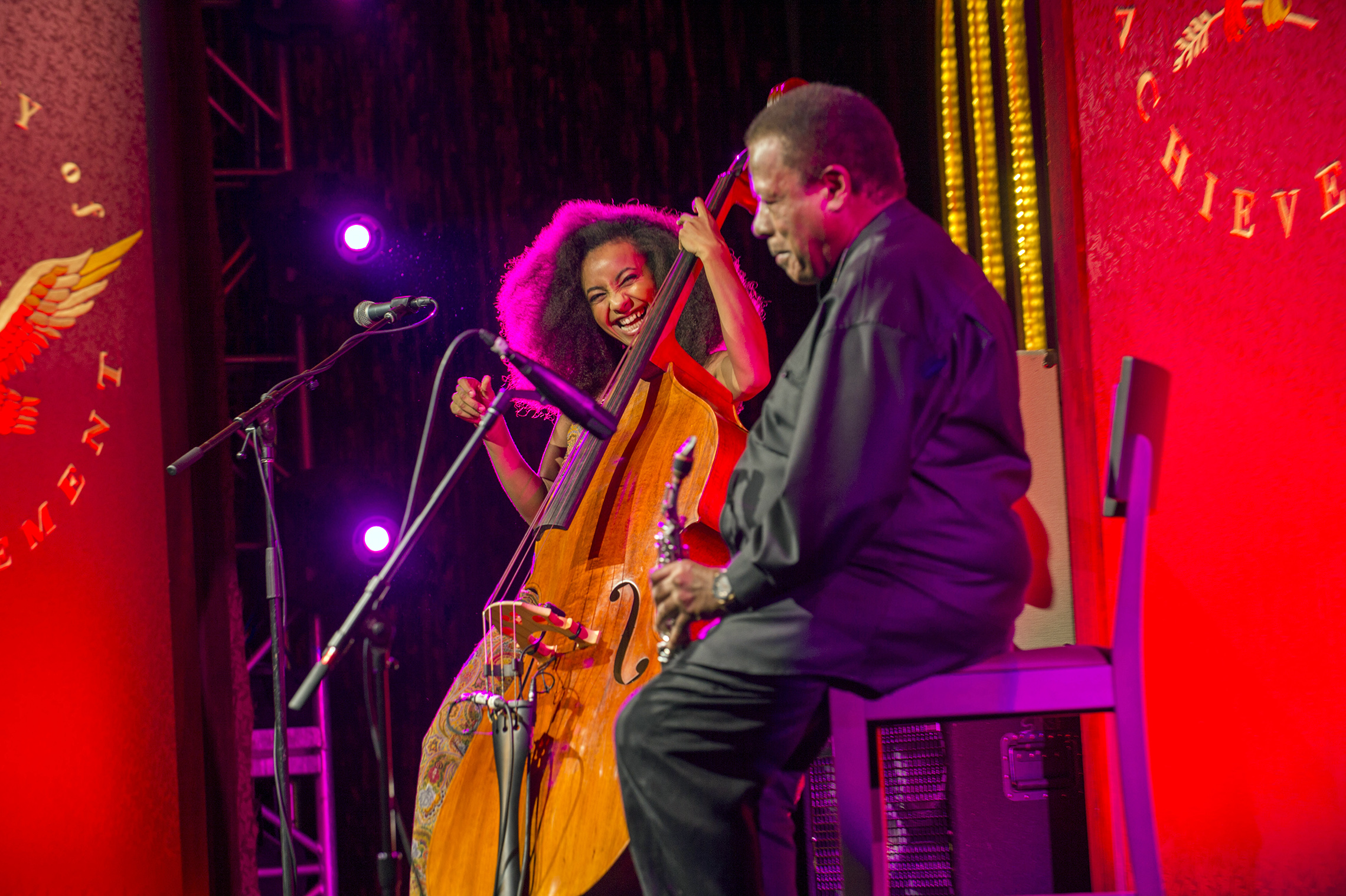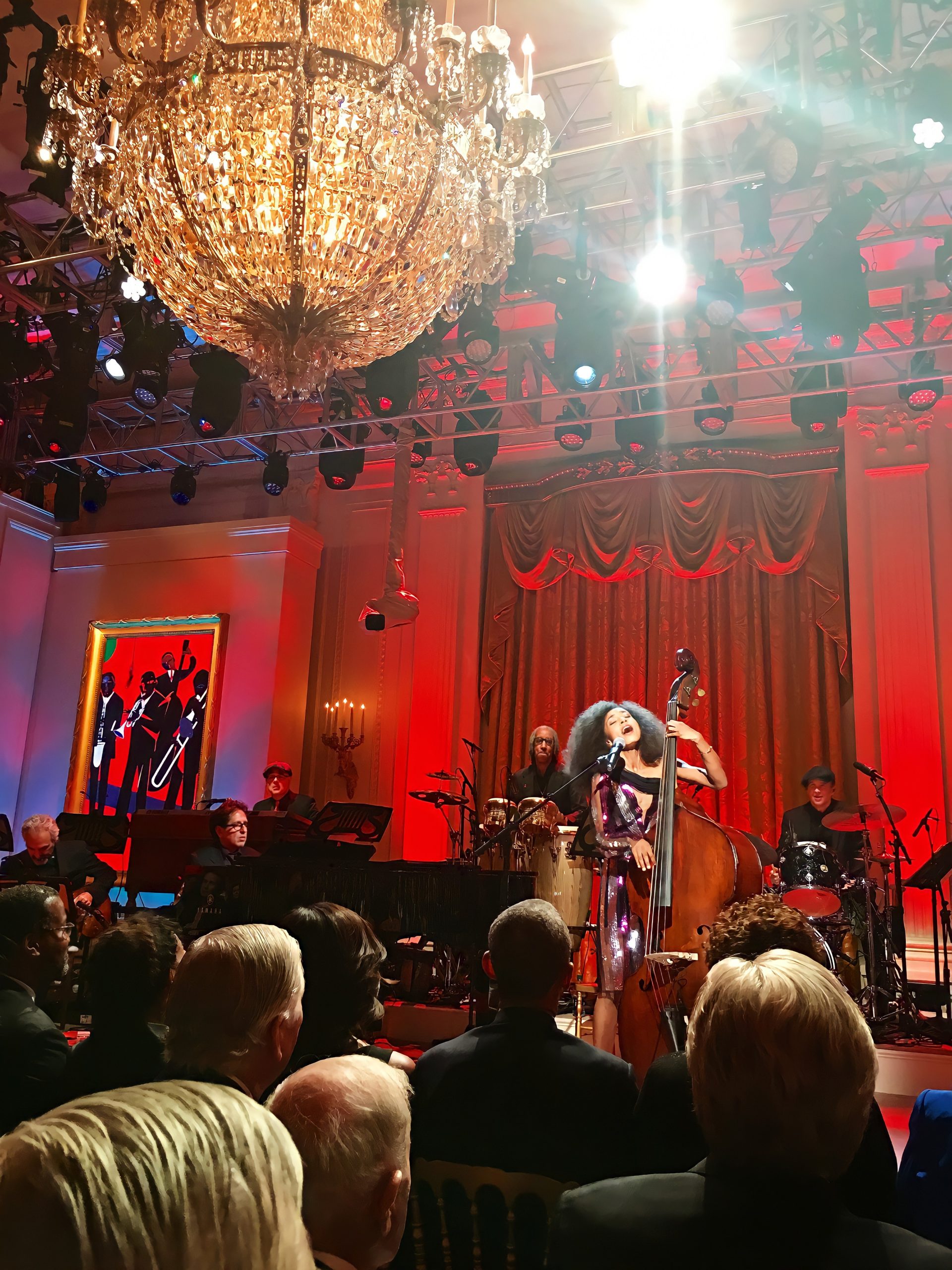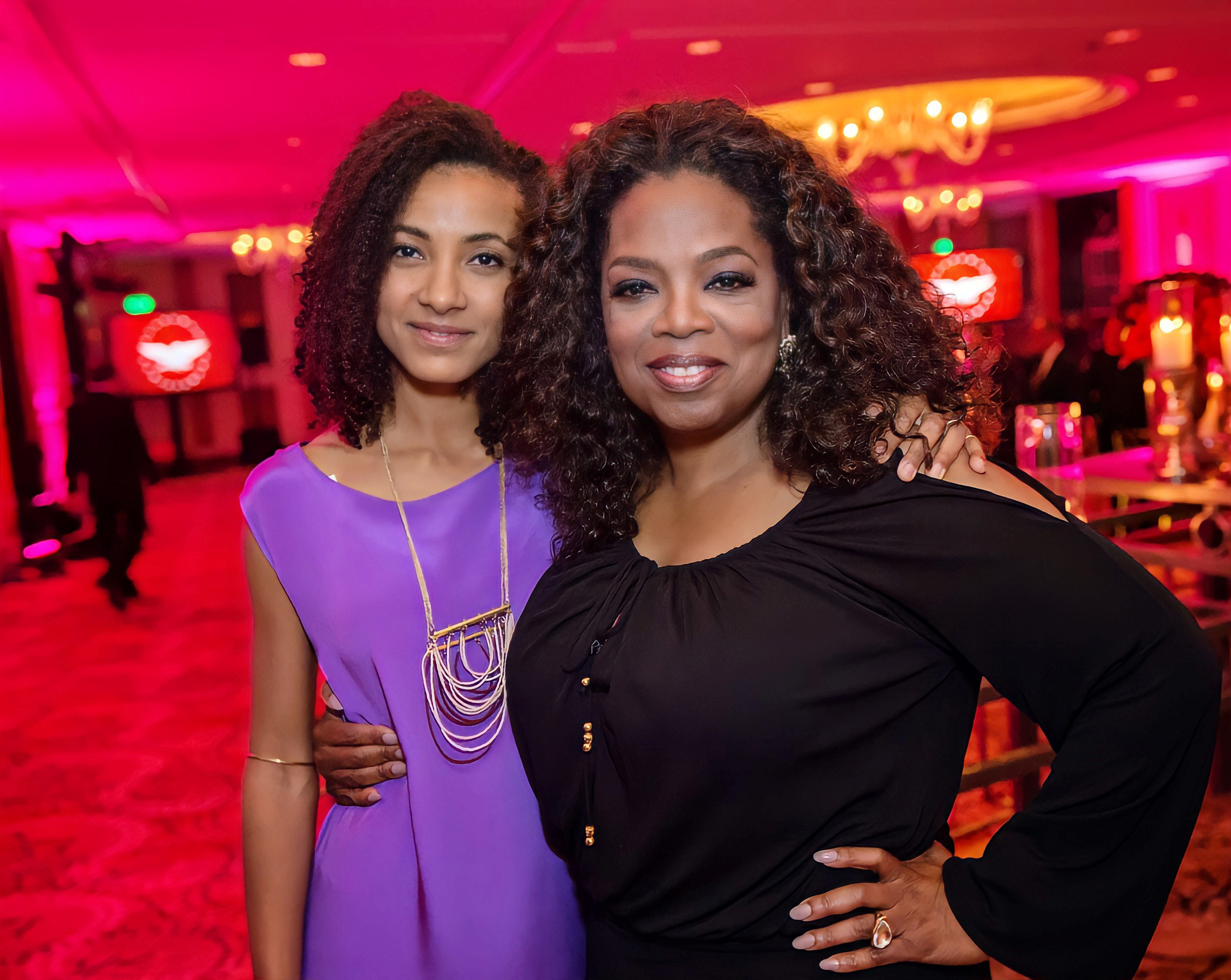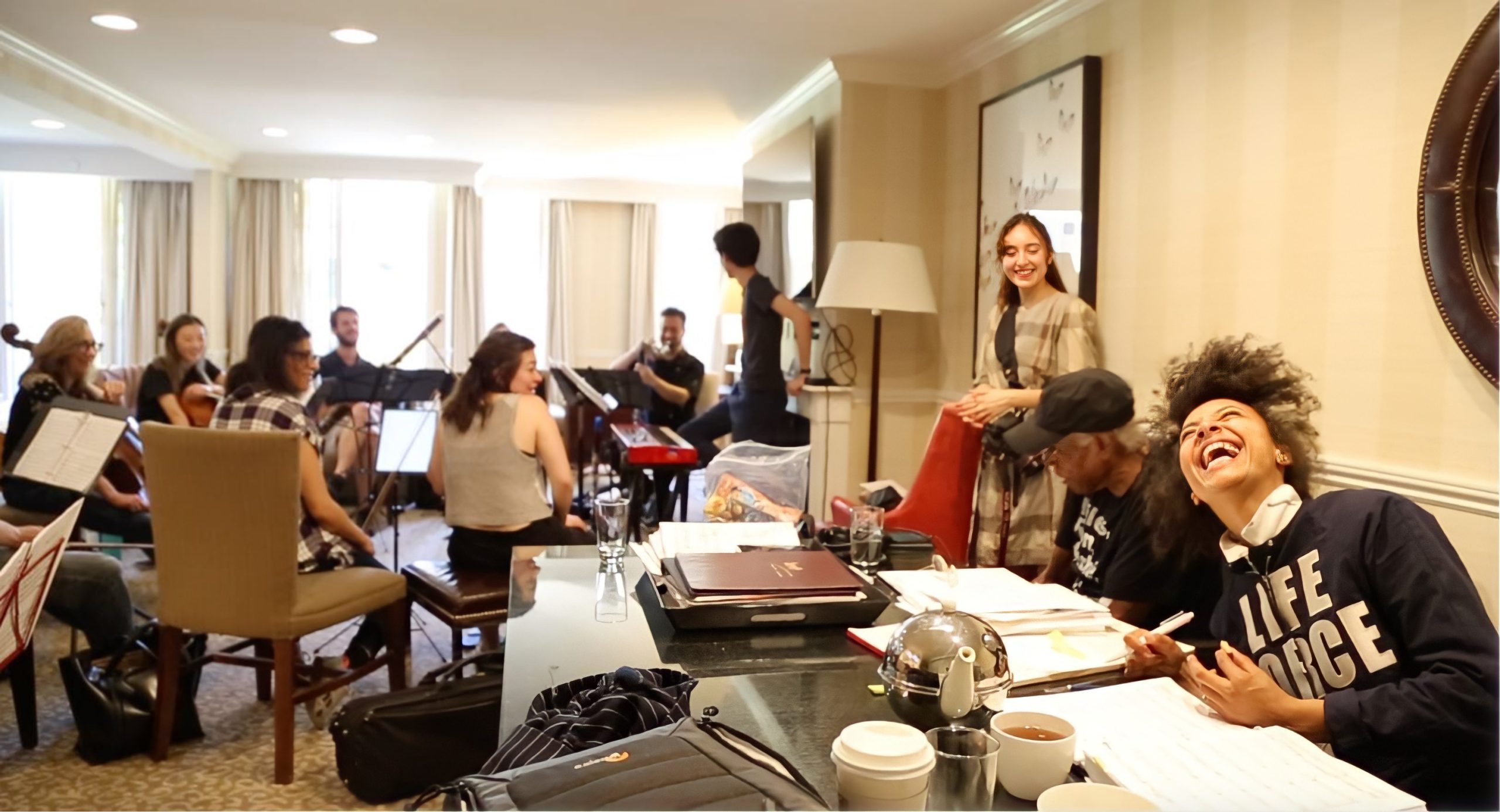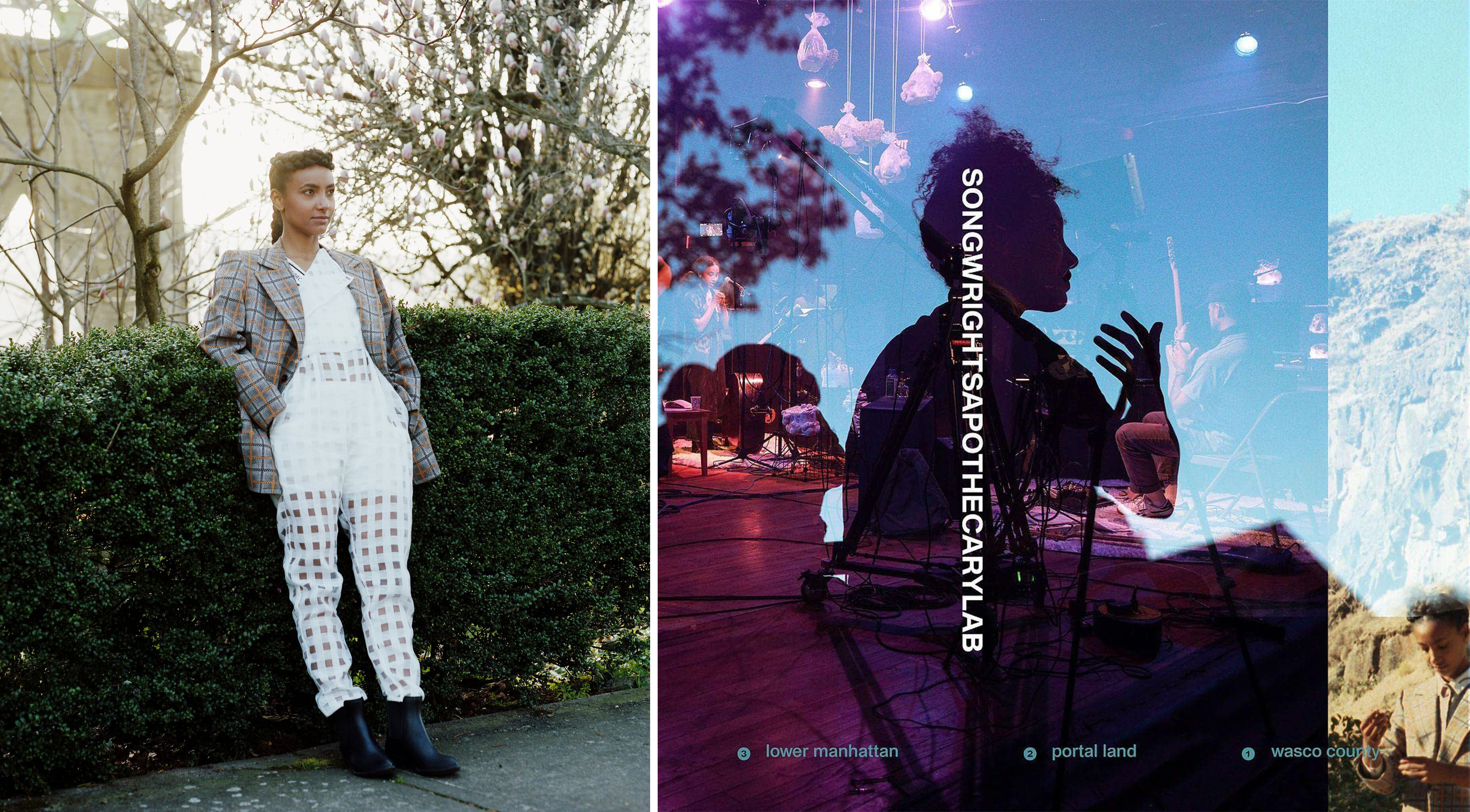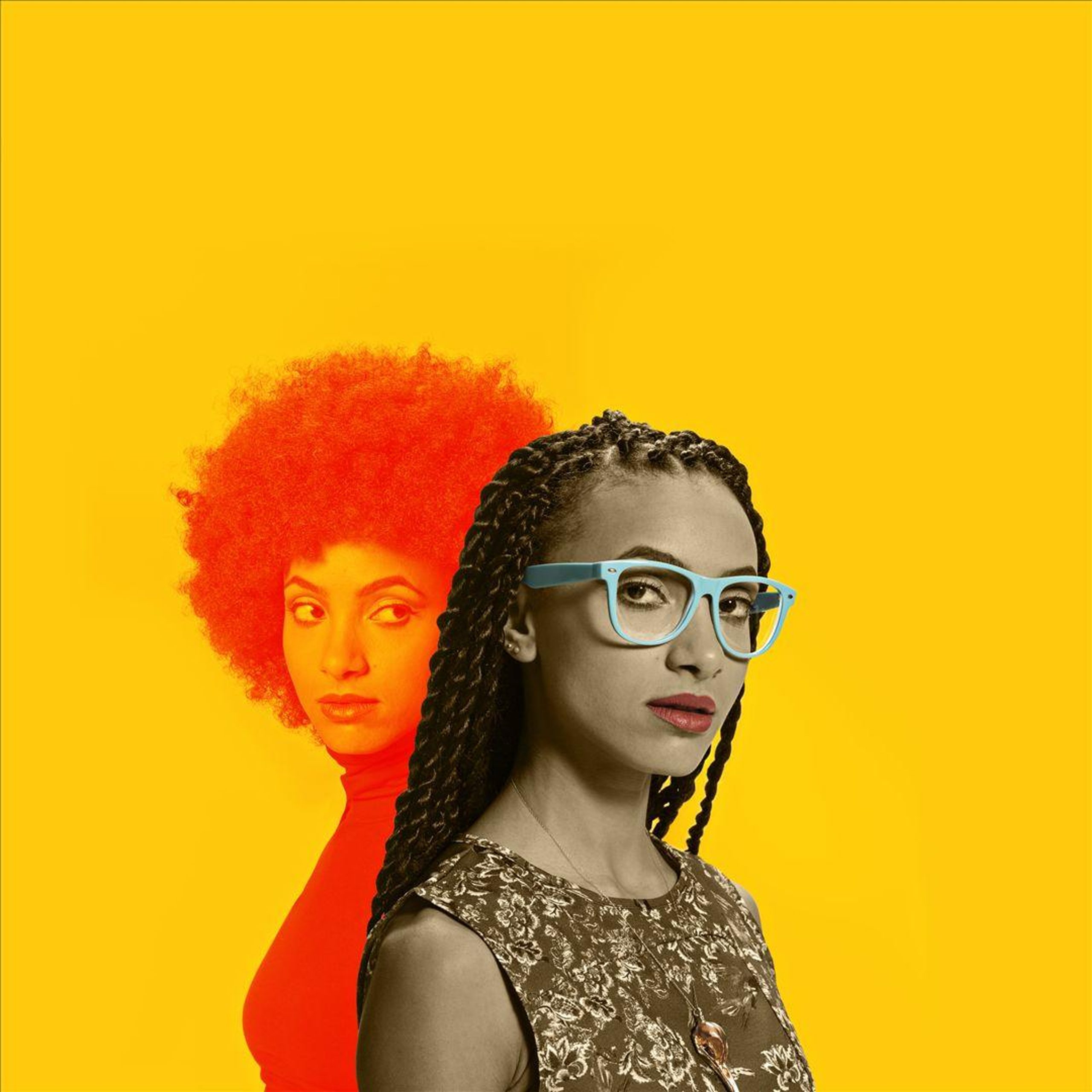You have a remarkably open mind musically. There are so many streams of music flowing through your albums and your songs. Did your mother encourage an open-minded approach in general?
Esperanza Spalding: That way of looking at music that isn’t strictly in one category never really was in our palette of conversation. I sort of feel like, if you look at a human being, let’s say somebody from — just to name any random place — Sicily. So you look at this human being and you say, “I want to deconstruct your DNA.” And you ask this person, you discover that there are some — for some reason — Russian ancestry. In some kind of way there’s Moorish ancestry. And then you discover there’s some Northern Italian, let’s say. I don’t even know. There could be some German ancestry. And you ask this person, “Now, how does it feel to be a part of all these cultures?” And the person is going to say, “I’m Sicilian.” And you go, “Yeah, but you have African and Russian and German and Italian. What’s it like to have all these things coursing through your blood? ” And the person is going to say, “I’m Sicilian,” you know. Whatever is that entity that in and of itself has grown through a long period of time in Sicily is inevitably the product over time of influences of — I’m not saying — this is obviously not historically correct. I’m just saying that to a Sicilian — “I’m a Sicilian. I’m a Sicilian if I’m Sicilian.” Music — the same way that love between two human beings who end up in each other’s path for an infinitely varied array of reasons — the love develops spontaneously, and the product, that child and the life of the child develop spontaneously and is influenced by the next person that falls in love. And this infinite network of connections and relationships that we see on the planet of human beings and cultures, to me, is the natural evolution of music too. So I guess I want to say the music I make is no more concerned about the Western classical influence or the South American influence as the Sicilian is that we’re doing the DNA study on to the Russian or the German.
When you live it, you’re not conscious of the influences, like where it’s coming from. I almost feel like there’s a fear of letting the door just be open and say, “Yes, I am obsessed with Shostakovich and that doesn’t contradict or inhibit or nullify my love of TLC,” just for a random example. And if you grew up in that, I think organically what you start to hear, the same way that if one of your parents is Russian and one is Italian, you become this beautiful combination of these influences, and you’re not like, “Oh, now I’m really acting Russian. Oh, now I’m really acting Italian.” It’s you speak that way, you feel that way, you hear that way, you think that way.
And I think, especially for composers, we don’t know — maybe we do — when Bartók was conscious of like, “I am borrowing this from a Hungarian folk song.” I would imagine, over time, he spontaneously would hear these melodies that were influenced by the music he had studied and exposed himself to. And in the age we live in now, where we are literally hearing sound and songs and different rhythms in movies all the time, there’s no way you can only hear it as a classical thing or a blah, blah, blah thing. I really feel like that is the future of music, and more than hearing like the specific influences and how they meld, you’re hearing the voice of an individual who just happens to be the combination of forces that they are. And everybody will choose how deep down the rabbit hole of these genres they want to study, but I think it’s more based on a love of a sound or a love of a composer. I do deeply love Shostakovich — deeply, deeply, deeply — and the love of his music makes me want to study his work, not to “bring more classical into my…” It’s just if you’re open to receive the palettes that are in this planet, you’re always going to have ideas. And it’s like, imagine being a painter and now you have like 35 more colors. And the reality is that what we’re observing is full of millions of colors. So, it’d be like, “Oh my gosh, now I can paint what I’m seeing for the first time,” or “Finally I know how,” and it really feels like now, having access to almost any music from anywhere on the planet, you just have infinite colors to paint the intangible that you hear or imagine, and now you have a larger palette to play with.
We’ve read that poetry is very important to you as well. You write lyrics obviously, so that’s another form of creativity in your life. Did you read a lot as a kid? Were you a good student in school?
Esperanza Spalding: I was not a good student, but I did read a lot. All the time, actually. And just to clarify, only in the last year have I really started even claiming that I write poetry. Now it’s becoming something that is really important to me, and I am recognizing it more and more as the tool that it can be when you’re inspired, and you know the craft and you know your tools. I always loved to read, and I always loved poetry, but I never took the time to really live with poetry and let it affect me the way that poetry can, as a sensory experience. It’s kind of like watching a film that you’ve seen many times, and then paying attention to the music, like I want to say All About Eve, or something that. The story’s so captivating you’re just watching it and laughing at what’s to laugh at, and being heartbroken at what’s to be heartbroken at. And then someone goes like, “Man, but have you heard the score?” and you go, “Oh!” and you watch it again, and you suddenly feel this added depth of what the music contributes. So in the last year I have started experiencing poetry as the sensory experience. It’s really kind of like multimedia before there was multimedia, you know, great poets. You literally taste, feel, sense the temperature, the air. I mean you have this full sensory experience of a thought, which is really abstract if you think about it. I can write something — it’s kind of like — it’s almost like Wi-Fi, you know? I can write something over here, read it, and you have the same physical sensory experience or something similar to what my thought was. That’s very magical to me, and that’s a whole can of worms, or Pandora’s box, or whatever you want to call it, that I’m really excited to be peeking into now ,kind of for the first time in my life I have to say.
How would you describe what you do in music?
Esperanza Spalding: I am a composer I guess. I would say, within music, or the performance of music, I focus on voice-based poetry, lyrics, and composition and arranging, which is a part of composition too.
What poets are you drawn to?
Esperanza Spalding: Oh my gosh, so many. Right now I’m into Gary Snyder, which is really crazy. And I love Dylan Thomas. Of course everybody does. I wish I’d brought my book, because I’m really bad with names. I’ve always loved William Blake. Always, always, always.
You were reading Emily Dickinson during a recent interview.
Esperanza Spalding: Oh, yes! Emily Dickinson is also very, very, very — a lot of her stuff is very abstract. It’s dark and abstract. I think David Bowie is an amazing poet. Obviously Joni Mitchell. Not that I’m sitting around reading her poems, but I hear the poetry in her music. I like to listen to her poems in the songs.
Your house was multilingual, we understand, when you were growing up. What languages were you hearing?
Esperanza Spalding: Well, I grew up hearing Spanish even though we’re not Hispanic, because my mother speaks Spanish. I don’t remember why now. I just remember the presence of a lot of Spanish-speaking women in the house around. I know before I was born she was involved in the farmworker’s union in California. She is a person who’s just engaged with the people who she feels are really doing the underdog work, of bringing something to the surface where then it can become a topic that it’s cool to talk about and be all liberal on. I remember distinctly Spanish-speaking women in the house and my mom always spoke Spanish. So I grew up with that.
How about Portuguese?
Esperanza Spalding: Portuguese I started studying in college because I wanted to understand the poetry in these Brazilian songs I was becoming obsessed with.
It’s not an easy language, is it?
Esperanza Spalding: Well, no. English is much weirder and harder though than most languages, than most of the Latin-based languages. Actually Spanish or Portuguese are gloriously logical phonetically and grammatically and consistent. So I was studying Spanish and then Portuguese. A lot of the grammatical rules and conjugation rules are the same. So they felt like a natural outcropping from each other. I’m definitely not fluent. I couldn’t be a translator, but I can survive.
You said school was tough for you. Do you think you had a different way of learning?
Esperanza Spalding: I just thought I knew everything and I knew better than all my teachers. Foolishly so. I just thought, “Y’all don’t know.” And I didn’t take authority very seriously at all — at all. I wanted to be special and I wanted to do things at my own pace, and I wanted to focus on what I thought was interesting more than other things, and that doesn’t work when you’re one of 30 or 25. So I just didn’t do very well. I love learning though. I loved learning. In class, it was perfect because everything was brand-new, and everything under the sun. You don’t know anything yet. So I just found being in class completely amazing and satiating, and I wanted to go to school and I wanted to be in class, but everything else wasn’t very cool. Tests and studying and — I think of myself as a learner by osmosis. I study things very specifically. I break it down into as many pieces as I can and put it back together a million different ways. But about two months later I can’t remember anything that I studied, but it stays in me somehow by osmosis. And I can only prove that because of music. Other musicians know this too. You’ll think that it didn’t do you any good. You worked on something for eight months for Jiminy’s sake, you know, a concept or a harmonic concept and you applied it in all sorts of keys and you applied in all these tunes and different tempos, and you put it in a live setting, and then when you want to do it, it’s like — ah! — it doesn’t come. And then maybe a year later it’s ingested enough or you’ve absorbed it by osmosis and there it lives. And I’m really grateful for music because I think for other walks of life the way my brain seems to work it wouldn’t be good. I couldn’t be a dentist and forget, you know, what you’re supposed to do. But I’m kind of making it comical. I wasn’t a bad student. Actually what happened is I got really sick and I ended up missing a lot of school, and I missed so much that I couldn’t catch up again.
You got really sick? What was the matter?
Esperanza Spalding: I had some autoimmune deficiency thing going on. My joints would swell up and I couldn’t move. So I started home schooling. When I went back to school, I couldn’t plug back in to the pace until college. Then I was cool.
It must have been tough on your mom. She was a single parent. She had to support you and teach you and also take care of you when you were sick.
Esperanza Spalding: Yeah. Fortunately I got better during the home schooling time. This is maybe a little out of place. I just feel like it’s important to say. Who knows who may see this? I feel like my mom is the antidote to the myth of “the welfare mom” and “welfare babies,” because there may be individuals — and I’m sure there are — out there who really abuse social services, but I can say that we would have been homeless. We could not have survived without public assistance. My mom is the hardest-working person I know. I don’t know how she raised two kids and did everything. She had her own health problems too. I don’t know how she did that.
What kind of work did she do?
Esperanza Spalding: Everything under the sun. College educated but just — I don’t know. Some people miss the boat. It’s not that she’s not smart. She’s incredibly intelligent and incredibly hard-working and very honest. She has a lot of integrity. And not only all of that, she somehow found the time to kind of train her kids to be critical thinkers. So we never would just be sitting and like ingesting something from TV or from a magazine. She always would try to open our eyes to a counter-commentary or a counter-perspective. I would always remember, you know, we learned the word “prostitute,” and we came home and she used it and she’s like, “No. They’re prostituted women. These are women.” Not… you know. “Yes, that is awful and it’s tragic and it’s illegal.” She’s like, “But these are women. These are human beings that are in a…” you know. That’s just one small example, but I just think of the time and the care and the attention that my mom found for me and my brother. And I’m baffled that she was working sometimes two jobs. And she herself went back to school. So she’s juggling all this, and being such an attentive teacher really to me. Anyway, just to say that those welfare checks and food stamps and Section 8 literally saved our lives, genuinely. I always like to give the example of my mom, because if anybody sat down and had a conversation with my mom, you’d think like, “Oh my God! You should be like a CEO of something.” She’s so smart. And so it’s not — for a lot of families, it’s not lack of intelligence or — what is the other word I want to use? Tenacity, entrepreneurship. It’s not a lack of those qualities. It’s just, if you’ve never had to figure out how to feed three people on $8, or working a full-time job and the wage is not enough to pay your living expenses, if that’s a state you’ve never had to reach, I think it’s really hard to fathom why don’t you just get your stuff together and just make it work. It’s a really odd position in life to be in. And on top of that, just the stress of having dependents and not knowing — actually not having the answer of how you are going to solve that. And whatever that is, the wherewithal to just keep going and not become an alcoholic or a drug addict, and still really try to instill, like my mom did, this sense of like, “You can do anything,” and “Use your mind. Use your potential. Use your heart.” I don’t know. I think my mom is an example — one of the many examples — of an antidote to that myth, I think, that people are just sitting around collecting checks. I feel really grateful to the programs that were available at that time. Everything from school lunches to all the programs that we took advantage of and used to their full potential at that time to step beyond that state of living just day-to-day, month-to-month, which fortunately did happen eventually. But yeah. I don’t know how she did it. It still kind of boggles my mind. It really does. She’s pretty hardcore.
It must be incredibly heartening for your mother to see what you’ve accomplished.
Esperanza Spalding: The best part is she’s not worried about accomplishments. Like when I talked to her about the Grammy, she’s like, “Oh neat, what is that?” Anyway, I just cut out this article from the newspaper I think you’re really going to like.” She’s not very concerned with how the dominant culture perceives your success, because she’s never really operated along that value scale either. I think what really interests her is how we treat each other. That’s what interests her about human beings. Her heroes are — her favorite musicians, her favorite thinkers or writers or commentators — are people that she receives a sense of their humanity basically. So I think she could actually care less how well I’m doing and more just how I’m doing and how I’m living on the planet, which is, of course, a lifelong project. You’re always trying to get yourself together. But yeah, I had a really — have a — very one-in-a-million mom. I see over and over again how, for better and for worse, her worldview really colors the way I do things and the way I receive information, and I’m really grateful.
Is it true that you more or less taught yourself violin at a very young age?
Esperanza Spalding: Yes. Only because we didn’t have access to regular lessons. The truth is, you can go a long time off of a couple good lessons. I think the teacher knew we wouldn’t be able to come regularly, and I liked to play. So if you have those two things going on, there’s really no excuse for not becoming the musician you want to be. If you have a good teacher that gives you good material to study and you want to play, you’re all set. You’re really all set.
You left school at 16 and got your GED and then went to Portland State, where you were the youngest bass player there and had only been studying for how long?
Esperanza Spalding: About a year and a half.
You must have progressed very quickly.
Esperanza Spalding: I am under the impression that what the teachers at PSU saw was potential. Because yeah, there’s only so much you can do in a year and a half. Obviously, I was coming from violin, so there’s things that translate to the bass. But again, there are the individuals in the public sphere who get a lot of spotlight and notoriety for their accomplishments in music, and for every one there are probably about 50 who never are in the spotlight and whose names may never be known outside their circle of people they have affected. But the real superheroes, as far as I’m concerned, in music, in what keeps music alive and evolving and moving forward and thriving and growing and expanding are those kinds of teachers like Ken Baldwin and Hamilton Cheifetz and many others — Darrell Grant — who were the people that had so much infinite patience with my little wild character, and supported and fed and nurtured and disciplined potential, because that’s all talent is. It’s not worth anything. It’s like having a pick and a hammer. If you don’t know where to dig for gold, you just have some tools and not much to do with them. Which is to say that me being at that school wasn’t so much about like, “Yeah, I only played for a year and a half and I got into PSU.” It was these teachers who saw something that could be cultivated, and I still have a lot of work to do to cultivate what they saw. But really all of what you just mentioned is props to those teachers. And I don’t know how they have the patience. I hope they only get one as annoying and wild as me every once in a blue moon.
You went from Portland State to the Berklee College of Music in Boston. In addition to expanding your knowledge of music, you started networking there with some amazing musicians.
Esperanza Spalding: That, to me, is the crowning glory of that school. It’s a crossroads, where you’re going to run into everybody from everywhere doing everything. Everything from film scoring to electronic music to gospel music. You have Korean traditional music. Anything you can dream of is happening there. And it’s still out of an economic system. So you actually are willing to go play any time for free. A lot of people are, which is something that’s really hard to recreate once you get out of school. Part of what you’re there for is to play all day long. I know my experience isn’t unique, in that I have crossed paths and rubbed skin and rubbed ideas and exchanged ideas with hundreds of people from everywhere.
Stanley Clarke was there, wasn’t he?
Esperanza Spalding: Oh yeah. That’s not even to mention the other big names that you get to meet if you’re lucky. I got my first real touring gig with Patti Austin because she was there. and I got to audition for her and worked with Pat Metheny and Gary Burton and Joe Lovano who became a school for me outside of school.
You ended up touring with him.
Esperanza Spalding: We still play together. I met lots and lots of people. Good players and great players continue to develop through word of mouth basically. So you know, nobody’s going to hire you many times if you’re like “okay.” And you know that. You learn that right away. It’s very real. I feel like most of the people I knew, we were living off of our playing. So you have not just the incentive of becoming greater, but you want to work. And if you show up at a little gig, even if it’s a jam session, you never know who’s listening, and if you’ve really done your homework and you’re evolving, you’ll get a random call. I remember getting a call from Kenny Garrett, who had heard from somebody, and Donald Harrison called me to play. That sounds like name-dropping, but it’s not. It’s just it’s that circle. You know, you hear somebody play and it’s interesting and you need a bass player. Well, they always need bass players. Just for the kids to know, it’s a good instrument to study. You’re going to get called. And then that leads to this. And voila!
You’ve got to be ready, though.
Esperanza Spalding: Oh yeah. If you’re not ready for that circumstance that you end up in, you have to have the gall to turn that shame and embarrassment into fodder for the next phase of study. That’s hard to do, because you feel like crap.
Has that actually happened to you?
Esperanza Spalding: Oh my God, it happens all the time! I’m grateful when that happens, because it shows you areas that you need to work on. That’s the greatest gift for an artist to have.
That part of you that is hungry to grow can atrophy if you always feel like you’re on top, ’cause then, where are you going to go? But getting your butt kicked and really getting embarrassed and like, “Ooh, I need to work on that.” Being willing, I guess, to recognize that that’s what’s going on. I feel like that is the greatest gift you could have, as a grown professional musician. ‘Cause once you’re out of school, no one’s going to come up and tell you “That was sad,” unless you’re in a couple of clubs in New York. There’s this place that — ooh, I haven’t played in many years — but sometimes I go down there. It’s called the Fat Cat. And it’s this weird place with ping pong tables and it’s just very bizarre, but there’s always a jam session happening. And one night, this piano player was down there playing. He’s playing, you know, and he’s taking a solo, and this guy sitting next to him like “Mm-mm. Mm-mm. You ain’t doing it for me.” And he just sort of like tries to ignore the guy and he keeps playing and he’s like, ‘Really?” So, he’s like keeping focused and he’s trying to block this guy out and he’s like, “Man! Mm-mm. Sad!” You know, commenting, commenting. Finally the guy stops. He’s like, “Man, give me a break! I mean, is that really necessary?” And the guy heckling him says, “Well, don’t get mad at me. You’re the one playing all that crap!”
That’s rare, though. Usually what starts to happen is you start living in a bubble, and the more — the better you’re doing, the bigger the bubble becomes. So the further you have to go to have some real — a real interface with a musician who’s really going to be straight with you, or a listener who’s going to be straight with you. I don’t know why I’m talking about this, but I guess in case some young people are listening, that’s a gift. If somebody’s willing to talk down to you, or criticize you — I’m sorry — be critical of your playing, that is really a great gift because as I’m sure we know from other fields, when somebody doesn’t think you have any potential, they don’t say anything. There’s something there that rubbed them. Like if you ever think somebody’s just really sad and really not doing anything, you just kind of like brush it off, but when something that somebody’s playing really bothers you and you keep thinking about it, to me that means it’s affected you. It’s like the opposite of love is not hate, it’s indifference, right? So if somebody is taking the time and the energy to be mad at you or get on your case, that’s a really good sign, I think, that there’s something — there’s more to dig out.
How did it come about that you started teaching at Berklee College of Music at the age of 20? You must have been the youngest teacher they ever had.
Esperanza Spalding: I think you have to ask them. That surprised me too. When the President asked me to come in and teach, I just thought I must be filling some demographic that is needed here in the teacher roster. But that’s not solely true. I taught a five-week program, like a bass-specific five-week program to teenagers. So I was a graduate at that time, obviously. It was the summer after I graduated. And I guess I got good feedback. And they asked me to come on as an instructor. That’s a really humbling and inspiring situation I recommend for any musician, because it really forces you to look critically at your own process. I think many times we’re not even aware of how we’re progressing. It’s very intuitive, or might be just based on something you learned a long time ago. So it’s A: Looking at what you’re doing that’s not really working very well. And B: How do you improve your own methods and find a way to translate your method for every different person? To me that’s an extension of performance, right? Because you know what you want to convey. You’re feeling it. You’re believing it already. But it’s like, “How do I translate this to you, or to this room, or to this student?” I feel like it’s an extension of performance and composition and poetry, ’cause you’re trying to take a very abstract thought if you think about it. How can you get from not being able to do something to doing it in a way that you, dear 18-year-old from Tallahassee or whatever, will be able to use? And the evidence is going to show up next week, and that you’ll feel inspired to use? Ooh, it’s challenging! And you don’t succeed every time. But I felt like that was a really big gift, and a great lesson that I’m just really realizing now is an extension of performance. I mean, you’re kind of trying to turn on a similar electrical field, so to speak, when you’re performing. It’s like, “I want you to get this.”
You’re trying to reach people.
Esperanza Spalding: Yeah. Simply put.
You have just pointed out the creativity in teaching.
Esperanza Spalding: Oh my. Great teachers are the most creative. Absofreakinlutely. Absofreakinlutely. I still remember one day — this is just very poetic. It’s also funny. Ken Baldwin — bless his soul, may he rest in peace — was my bass teacher at Portland State University. And one week we all came in, and we hadn’t practiced anything. I don’t know why. There must have been a good party that weekend or something. And this is a very serious and consummate bass player who, you know, has better things to do than sit in a classroom with a bunch of little snot-nosed 20-something-year-olds and one teenager who didn’t work on what he said. So, he’s a very elegant gentleman. It’s like he’s trying to think, “How can I translate what I’m feeling to these students in a way that they’re going to get it?” And he just says, “Have you ever had a puppy?” We’re all going like, “Hmm. This is an interesting way of being reprimanded.” “You know, it’s just so sweet and you’re just so sweet to it, and you feed it and you give it water, and then it pees on the carpet and you just want to kick it, but you can’t. You know you can’t.” That went straight to the heart. Oh! So whatever. My point is, I don’t know of another way he could have expressed that thought in a nonviolent way. And I promise that was the last week we ever didn’t go ‘shed. And I’m sorry to put all your business out there, Mr. Baldwin, but that’s to me a very beautiful poetic example of the creativity flowing through great teachers. And of course, that’s a silly sort of topical example I wanted to use, because in musical terms not everybody might appreciate it, you know.
It sounds like he spurred you to action.
Esperanza Spalding: Absolutely. And you know what’s ingenious about that? The means that were needed at that moment to get us to the next level weren’t musical and they weren’t technical. It was psychological. Sorry. I feel like the greatest teachers I’ve had are part psychologist. You have to understand what’s going to reach this person and help bring out what’s in there. Sometimes fear and guilt are relevant tools within the arsenal.
What spurs your creativity? You became a composer early on. Where do you think that creative spark comes from? It’s very different to be a performer than to write music yourself.
Esperanza Spalding: Where does the creative spark come from? You know, it can be the residue of working consistently towards something you haven’t been struck by yet. You may be a poet that doesn’t feel inspired. But by going through the motions, so to speak, of the tools of your craft, this other — like “dark matter” — is generated that starts to take on a density and a form and a reality of its own. Then there’s the type of creative spark that is literally just a spark in the dark, and you don’t know what caused it and you go searching for it. And the process of searching for it usually reveals a piece or a project or an idea. I think of it like excavating ruins or fossils. And I think even that can be intuitive. Like, what if we dug here, or you can do the research to discover, “Oh, if I dig here, there’s going to be something.” I know in my case — this feels really silly to talk about, because it’s so vast and nebulous and sort of globular at times. The feeling of an idea hitting you? It’s really hard to grab the tail of a cloud, and like,”It looks like this!” That being said, a title will come — and then it’s like a chain reaction, like buh-da-da-da!. And then a whole song develops. Like a slip of the tongue, the other day. We were joking about hardened criminals and we said “hardened subliminals.” And then we kept spinning off — I kept — Lee and me and all the ones inside my head kept spinning off of what that could mean. Hardened subliminals. What would that mean? Then it starts to bring up this imagery of like the prison of your mind, where these subliminals that you haven’t even been realizing were in there — you don’t even know why they’re in there in the first place, or who sent them there, or where they came from. It’s like they’re in there so long they just get hardened and then they can’t change. And you don’t know where to send them. Anyways. And then that — it just can go on forever. But many times a little thing over there turns on a whole world, kind of. It’s like you didn’t know that there was a switch that was connected to all this, and now it all starts to come alive and you just want to tell people what you saw in that toy store.
You have to be willing to be receptive to those instincts, don’t you?
Esperanza Spalding: And try to follow through. Like I said before, talent is not a quality in and of itself. It’s a — actually, I’m sorry — it’s a quality like tall or big lips or long fingers. It’s a quality. It’s not necessarily an advantage or of value in and of itself. So yes, it’s wonderful to see things that that other person doesn’t immediately see, but if you can’t do anything with it, you’re not an artist. It’s still cool for you. Like I have a great time just spinning little funny ideas off in my head all the time, but I feel like I want to translate them into a tangible form that can be shared. So yes. I think it’s very crucial to be receptive — just in the world, as an artist — to sounds and images and ideas. And there’s this thing called follow-through, where you take that thing as far as you can take it. And it may be a dead end, but the dead ends lead to something else too. So this thing of follow-through, and then also the willingness to accept a failure and turn it into a success. That can be the most annoying thing ever, when you’ve spent all this energy creating something and you have this thing that’s like, let’s say it’s a poem and it’s like, “Wow, it’s eight verses! This is awesome!” And then you put it down and you look at it a week later and you realize all the weaknesses in it, or you realize that nobody understands what you were trying to say, but you like it. My mom would always say, “Well, if you like it so much, place it up on the wall,” but don’t leave it at that. If you love that line that you wrote, or you love that visual that you made, great, put it on the wall. But if you want this to be a consummate piece of art, or a piece of work that other people can engage with, you’ve got to improve it.
It’s like an editor, you know. You don’t just hand out the 16 or, let’s say — I don’t know, it’s way more — 300 hours of footage. You edit it, and you re-edit it and you re-edit it, and you check with your editor and you check with other viewers to see how your original idea is being translated. And I think that can be a really scary process for artists, because it’s like birthing this thing that nobody knew existed in the first place. So, how can you tell me if it’s not good enough? But there’s also this inner viewer, this inner more objective viewer that, if we’re willing to give it a voice, helps us become better editors and better refiners. And that, to me, is part of follow-through. Part of follow-through is taking it as far as you can take it and saying, “Ooh. Is that what it wants to be?” and sometimes it’s yes. Sometimes it’s no. Knowing the difference, and being willing to do the next stage of work, the next level of work. And it’s really annoying, but it’s the — I feel like — the most rewarding part of being an “artist.” It’s like nobody can tell you it’s done or it’s over. It’s never over. The process is never over. Art is never over. And you’re never over, because through your art you’re continually reinventing yourself and regenerating yourself. I mean, “What is an idea? What is the creative spark?” Well, either you can take the approach that it’s something out there in the universe that we capture, or it comes from the residue of what we are and our experiences. Either way, it’s a piece of yourself. So we get this luxury of having permission to constantly refine and redefine ourselves, which is a luxury that actually everybody’s afforded, but I think most people don’t give themselves room to do that, you know.
Talking about inspiration and preparation, the concept of a muse comes to mind. There’s a story about Shostakovich teaching a class, and one of his students did not complete the development section of the assignment. His excuse was, “Professor Shostakovich, the muse didn’t alight on my shoulder and I just didn’t have the inspiration.” And Shostakovich’s answer was, “I don’t want to hear about your muse. Just write the development.” Those of us on the outside may have a very romantic view of a muse, like a bird of paradise coming into your world and giving you an idea. But I gather it’s not necessarily…
Esperanza Spalding: Well, two things quickly. I’m trying to be more concise here. Let’s see if we can practice that now. I don’t remember which writer said this, but in an interview, a prolific novelist was asked, “Do you write only when you’re inspired, or do you write all the time? Do you wait for the muse, or do you just kind of knock it out? You can just sort of spin it out?” And he said, “Well, I do wait for the muse. I write when the muse comes, but fortunately she shows up, like me, every day at 9:00 a.m.” And to me, I think the anecdote is actually much shorter than the way I just said it, but that sort of sums up the point that I was trying to make earlier, with follow-through, and Doctor — I assume — Shostakovich or Maestro Shostakovich was trying to instill in the student. The way that I’ve learned, the way that I’ve convinced myself to keep at something when it doesn’t seem like any fruits are forming — because that can happen. You have an arranging project or an assignment, or preparing for a gig, something that’s very new and difficult, and it can feel like you’re doing the same thing and nothing is changing. You know you’re able to do it faster now. Okay. I couldn’t put that chord there as quickly, but it just doesn’t seem like much is coming, especially with lyrics and poetry because you know when the words are there, and there isn’t like a method to have great lyrics. And I always think to myself, “Well, if I were the muse and I had something really special that could only be translated through a human form, wouldn’t I want to give it to the person who was most, agile and fit for the task?” You know, like if you want to get this message to Marathon, you give it to a runner. You wouldn’t give it to somebody who doesn’t run very often, because you’re not sure if they’re going to make it. So I think if there is this kind of idea of a muse or whatever that could be, the muse isn’t going to waste all that gold on somebody who is not in shape. So you want to be somebody. You want to be a good candidate for the muse to travel through. The muse is whatever that is, magic to travel through.
It sounds like inspiration is all well and good but you have to be ready for it.
Esperanza Spalding: Absolutely. And don’t think of it like work. It’s the funnest and most glorious thing ever. Most people know that, and it probably seems like that. But you dedicate yourself. You make a commitment. You’re signing up for something for the rest of your life. Once we accept that this is my day gig and my night gig, it’s a beautiful thing.
As you said, it’s your life partner.
Esperanza Spalding: It is. It really is, and all that that entails.
Tell us about winning the Grammy for Best New Artist. It took a lot of people by surprise because you were up against some pretty famous people.
Esperanza Spalding: I don’t know what to say about all that.
What did you think of when it happened?
Esperanza Spalding: Five minutes before it happened, my brother was there and we were just sitting there like, “Isn’t this weird that we’re here? What is going on? Isn’t this trippy?” I just felt like, “We have tickets! We’re in the front! We can feel the fire from Arcade Fire on our faces.” It’s so weird to think of where we started and now we’re somehow a part of this big weird whoop-de-do. We just kind of looked back.
The general feeling was like, “It’s so weird and wonderful to be here, because this has nothing to do with what I spend most of my life pursuing.” I’m not creating the kind of art, and I don’t feel interested generally in being a creator of the type of art that is noticed by that organization. I can appreciate it. It’s just, I don’t particularly feel drawn to perform or write in — not like there’s “that way,” but you know what I mean. And so then what’s-his-name — not what’s-his-name, John Legend and Jewel up there, and I like both of them and we were just — I don’t know. I’m getting the feeling again. It was just like, “What? Okay. I’m glad I wore a nice dress. Let’s go try to say something.” And then I was thinking, “Wow. Well, this is going to mean we can play bigger venues.” That’s what I was thinking. And then I thought, “Okay. What are we going to do with this? This seems like something.” So then, right after that, I got like to do a bunch of cool interviews and be in magazines and all that. And I was thinking like, “This is not about me and my art. It’s just because now I’m somebody that something weird happened to.” And that was very clear to me that this is not about art. It’s not about what I’m doing. It’s about what happened in that situation. And I just thought, “Well, I do feel like, for me, the Best New Artist means potential, because ‘New.’ I always feel new”. So, I thought, “Okay. Well, I can live with that honor or that title because I think of myself as a new artist all the time. And I always want to be the best at what I’m doing. So, okay. That’s how I’m going to take this and just let the noise do what it does.” You know what I mean? Because it’s a noise machine. So let the noise do what it does. Recognize it was some weird fluke or whatever. However that happened, that’s what happened.
And then I thought, “Wow, this is going to make the Radio Music Society thing work better than originally planned, because I had this idea to bring musicians who are important to me, and put them in this album that was sort of like — the mission was to get the songs played on the radio so people would be, whether they knew it or not, hearing Joe Lovano and hearing Jack DeJohnette. And I feel like their spirit is translated through the vibrations of what they play. I thought that would be so cool if like some little kid in Arkansas who had never heard of jazz before hears this song that’s kind of grooving, and then they end up hearing Joe Lovano. That was like a little story that played out in my head. I thought it would be cool if it could happen. And I thought, “Well, maybe with the Grammy now, people will give it more opportunity.” But I want to say that opportunity is wonderful, and doesn’t necessarily make better art. So when opportunity and exposure align with great art, that’s awesome. And sometimes great art ends up happening under the radar for decades. And it’s just as crucial. It has to be in the planet. It has to be in the planet. It’s not like — “because one day it will be known.” You never know where that art is going to arrive, and who’s going to touch it and who needs it. You just never freaking know.
For all of the hype that Grammy created, it’s all died down now. And I just am reminding myself you don’t need all that to make incredible glorious art that touches a lot of people and can go really far. That should always, I think, be the predominant goal in your head because the music industry is always playing catch-up with what’s really happening. So if you’re out in the world trying to chase a version of what works, you’re already too late. All you can do is cultivate and bring out what you’re hearing based on your life and your dreams and your fears and your wishes. Bring it out the best you possibly can. Find people to help you bring it out better than you can do it by yourself, and then find the “demographic,” quote-unquote, or I just like to say, “the people in the world who will dig it,” because even if it’s one in a million, that’s still a lot of people who will like your music. And I guarantee you’ll be less likely to become an addict, alcoholic, womanizer, or sufferer of life. Which, there’s no good reason — if you won the womb lottery and you’re born in the “developed world” — you have to suffer through life. I think a lot of artists, they were born with this thing, this vision, this calling to do something that only they could see, and they compromise that for opportunity and exposure. I think they suffer greater than somebody who doesn’t get the notoriety but spends their whole life pursuing and developing their passion.
You’re the only one who can make your music.
Esperanza Spalding: That’s it.
It is truly an inspiration to talk to you.
Esperanza Spalding: Well thank you. Thanks for letting me blah-blah-blah so long. It’s just fun. It’s fun.
Thank you.
Esperanza Spalding: Thank you for asking me to do it.
